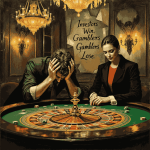
Market Opportunity: Profiting from Chaos, While Others Perish
March 13, 2025
On March 16, 2020, a single trading day wiped out $1.1 trillion in market value. Fear gripped Wall Street. The CNN Fear & Greed Index collapsed to 2—pure terror. Millions panic-sold, unloading their portfolios at rock-bottom prices. But in the shadows, a rare breed of investors began accumulating. They weren’t reckless. They weren’t guessing. They understood the game better than the rest.
Three months later, the market staged one of the most violent rebounds in history. Those who ran sat in disbelief as their former holdings hit record highs. They had made the same mistake that’s repeated across history—from the 1987 Black Monday crash to the 2008 financial meltdown, the COVID panic of 2020, and the banking crisis of 2023. The herd flees. The seasoned investor profits.
This isn’t just about buying dips. That’s beginner-level thinking. The real key is knowing exactly when to strike—understanding the psychology that turns sell-offs into golden opportunities. Chaos isn’t random. It’s predictable. Profitable. Exploitable. And those who grasp this truth play the game on an entirely different level.
Mastering the Art of Chaos
History’s greatest investors share a common trait: they thrive in bedlam while others break down. Baron Rothschild’s legendary words—“Buy when there’s blood in the streets“—aren’t just a slogan. They are a wealth blueprint. But make no mistake: this isn’t blind contrarianism. It’s strategic, calculated, and ruthless.
Consider March 2023. Panic erupted as Silicon Valley Bank collapsed, sparking fears of financial contagion. The media fanned the flames, and regional bank stocks plummeted 80% in days. The masses dumped everything. But those who kept their heads—who distinguished between fundamentally sound banks and the true casualties—saw their positions double when sanity returned.
This is the reality: market chaos isn’t a catastrophe for those who understand its rhythms. It’s a goldmine for those with the discipline to act.
The Science of Market Madness
The market isn’t driven by logic—it’s driven by fear, greed, and overreaction. Nobel Prize-winning psychologist Daniel Kahneman explained this decades ago:
- Loss Aversion: Investors feel losses twice as strongly as gains. This panic leads to premature selling.
- Availability Bias: Recent dramatic events get overestimated, making fear appear bigger than it is.
- Social Proof: Humans seek safety in crowds—even when the crowd is running off a cliff.
The result? A market that overshoots in both directions. The herd creates massive inefficiencies—and those who see through the illusion exploit them for generational profits.
Seth Klarman nailed it: “The stock market is the story of cycles and of the human behaviour that is responsible for overreactions in both directions.” Those who master mass psychology, technical analysis, and divergence strategies don’t just survive—they dominate.
The next crisis isn’t an “if”—it’s a when. The only question is: will you be the prey or the predator?
The Contrarian’s Arsenal
Successful crisis investing requires three core elements:
- Fundamental Analysis: During crashes, price and value diverge dramatically. Focus on companies with rock-solid balance sheets, sustainable competitive advantages, and management teams with proven crisis navigation skills.
- Psychological Preparation: As Jesse Livermore observed, “The market does not beat them. They beat themselves.” Before the crisis hits, develop rules and systems to override your emotional responses.
- Strategic Patience: Warren Buffett’s famous dictum – “Be fearful when others are greedy and greedy when others are fearful” – requires the fortitude to act when every instinct screams “run.”
The Modern Edge
Today’s investors have tools their predecessors could only dream of. Big data and AI can identify patterns in market behaviour, helping predict potential rebounds. But technology alone isn’t enough. The key is combining these tools with timeless value investing and behavioural finance principles.
Remember, market crashes aren’t random disasters but predictable manifestations of human nature. Understanding this dynamic transforms you from victim to victor, ready to profit when others panic.
Diversify Your Portfolio
Diversification is a time-honoured strategy to mitigate risk. Spreading investments across different sectors and asset classes—stocks, bonds, real estate, and commodities—reduces the impact of a downturn in any single area. This approach, akin to Montaigne’s idea of “a well-developed mind,” ensures resilience in a volatile market.
Spread Risk: To mitigate risk, diversify your investments across different sectors and asset classes. Consider including stocks, bonds, real estate, and commodities in your portfolio. Diversification helps reduce the impact of poor performance in any single investment, providing a more stable overall return.
Global Exposure: Invest in international markets to exploit growth opportunities outside your home country. Global diversification can provide exposure to different economic cycles, political environments, and growth prospects, enhancing the potential for returns and reducing risk.
Fugger’s Legacy: Jakob Fugger, a pioneering financier, understood the importance of diversification and global reach. Fugger’s investments spanned various industries and regions, allowing him to amass significant wealth and influence. His approach to business and finance laid the groundwork for modern investment strategies, emphasizing the importance of spreading risk and seeking opportunities worldwide.
Strategic Options: The Art of Crisis Profit-Taking
When markets crash, most investors focus on defence. However, the smartest players know how to turn market chaos into opportunity through strategic options trading. Think of options as your crisis toolkit – they let you profit from panic without risking your entire portfolio.
Here’s the key insight: Option premiums soar as fear spikes during crashes. This creates two opportunities. First, you can sell overpriced puts when everyone is desperate for protection – essentially getting paid to buy stocks at a discount. Second, you can buy calls on quality companies at bargain prices, giving you leveraged exposure to the inevitable recovery.
Consider this real-world example: During the 2020 COVID crash, put premiums on solid companies like Microsoft tripled. Investors who sold these puts collected massive premiums or acquired shares at fire-sale prices. Meanwhile, those who bought calls on oversold quality stocks saw their positions multiply when the market rebounded.
But here’s the crucial part – this isn’t about blind speculation. The most successful crisis options traders combine three elements:
- Fundamental Analysis: Focus on companies with fortress balance sheets and competitive moats. You want businesses that can survive any storm.
- Technical Timing: Use oversold indicators and volume patterns to identify optimal entry points.
- Risk Management: Never risk more than you can afford to lose. Position sizing and portfolio diversification remain critical.
Remember Warren Buffett’s famous options play during the 2008 crisis – he sold puts on the S&P 500, essentially getting paid to buy stocks at crash prices. The strategy netted Berkshire Hathaway billions while providing downside protection to panicked investors.
The beauty of this approach is its flexibility. You can adjust your strategy based on market conditions, from pure protection to aggressive profit-taking. However, the core principle remains: Market chaos creates opportunities for those who understand how to use options strategically.
Coffee, Crashes, and Contrarian Courage: A Morning Chat About Market Wisdom
Two investors sit in a quiet coffee shop, steam rising from their cups as morning light filters through the window
“You know what’s funny about market crashes?” Sarah takes a sip of her espresso. “Everyone treats them like natural disasters – unpredictable, unavoidable. But they’re more like clockwork, driven by the most predictable force in finance.”
“Human nature,” Michael nods, stirring his americano. “Fear and greed, same as it ever was. Look at March 2020 – the panic sellers who watched their old positions double by December. Or the banking crisis last year. Same story, different actors.”
“Exactly,” Sarah leans forward. “But here’s what fascinates me – we know crashes are coming. We know humans will overreact. Yet 90% of investors still get caught in the emotional undertow every time.”
“Because knowing isn’t enough,” Michael adds. “You need systems in place before the storm hits. Like that options strategy, we discussed – selling puts when everyone’s desperate for protection. Buffett made billions doing exactly that in 2008.”
“Speaking of Buffett,” Sarah grins, “remember his quote about being fearful when others are greedy? The real trick isn’t just being contrarian – understanding why humans act this way and having the courage to act differently.”
“That’s the paradox, isn’t it?” Michael drains his cup. “The biggest opportunities look like disasters at first glance. But if you understand the psychology and do your homework on fundamentals, these ‘disasters’ become predictable profit engines.”
“You know what’s really wild?” Sarah’s eyes light up. “Every crash teaches the same lesson, but the market never learns. It can’t – because markets aren’t rational entities, they’re collections of emotional humans making emotional decisions.”
“And that’s exactly why crashes will keep creating opportunities,” Michael concludes. “For those who can master their emotions, who see the pattern behind the panic…”
“And who dares to act when everyone else runs,” Sarah finishes his thought. They share a knowing smile as the morning sun grows stronger, illuminating the truth they both understand: Market crashes aren’t endings – they’re beginnings disguised as disasters.
Reflective Reads: Articles that Make You Think














